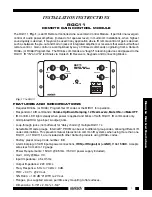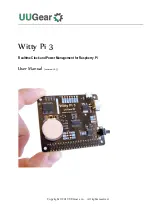
217
•
If you do not assign the key pair a name, the system assigns the default name to the key pair
and marks the key pair as
default
. You can also assign the default name to another key pair,
but the system does not mark the key pair as
default
. The name of a key pair must be unique
among all manually named key pairs that use the same key algorithm. If a name conflict occurs,
the system asks whether you want to overwrite the existing key pair.
•
The key pairs are automatically saved and can survive system reboots.
Table 18 A comparison of different types of asymmetric key algorithms
Type
Generated key pairs
Modulus length
RSA
•
In non-FIPS mode:
{
One host key pair, if you specify a
key pair name.
{
One server key pair and one host
key pair, if you do not specify a key
pair name.
Both key pairs use their default
names.
•
In FIPS mode: One host key pair.
NOTE:
Only SSH 1.5 uses the RSA server key pair.
•
In non-FIPS mode: 512 to 2048 bits,
1024 bits by default.
To ensure security, use a minimum of
768 bits.
•
In FIPS mode: 2048 bits.
DSA
One host key pair.
•
In non-FIPS mode: 512 to 2048 bits,
1024 bits by default.
To ensure security, use a minimum of
768 bits.
•
In FIPS mode: 2048 bits.
ECDSA
One host key pair.
•
In non-FIPS mode: 192 bits, 256
bits, 384 bits, or 521 bits.
The default is 192 bits.
•
In FIPS mode: 256 bits, 384 bits, or
521 bits.
The default is 256 bits.
To create a local key pair:
Step Command
Remarks
1.
Enter system view.
system-view
N/A
2.
Create a local key pair.
•
In non-FIPS mode:
public-key local create
{
dsa
|
ecdsa
{
secp192r1
|
secp256r1
|
secp384r1
|
secp521r1
} |
rsa
} [
name
key-name
]
•
In FIPS mode:
public-key local create
{
dsa
|
ecdsa
{
secp256r1
|
By default, no local key pairs exist.
















































